Years ago, despite relocating to live with her husband, Ng Sock Cheng felt out of place in a foreign land; at Tzu Chi, she regained the sense of belonging, of home. Returning to their homeland set the family at ease, drawing them closer to the native land.
Every morning, Ng Sock Cheng admires the sight of some 20 different plants in the yard, a few of which sprouted by chance.
The U-shaped green lawn was previously covered in weeds. During the lockdown in March 2020, Sock Cheng started planting vegetables with her son, Low Zi Jing. Her husband, Low Kin Fook was reluctant to join because he was not comfortable being dirty. As time passed, he began working with them in the sun and a land of vegetables was born. He also dug several compost pits, dumped in the food waste and compacted them with layers of soil. Over time, various seedlings of vegetables and fruit trees sprouted in the lawn.
The unintentional turn stemmed from the intention to use less plastic. Sock Cheng tried keeping food waste in trash bags longer so as to reduce the number of bags used. However, the hot climate attracted insects and flies easily. She bought an expensive food waste bin and compost microbes, but both ended in failure. Since they moved to the house with land and made compost pits, trash was reduced from one bag a day to one bag a week and new life grew from the earth.
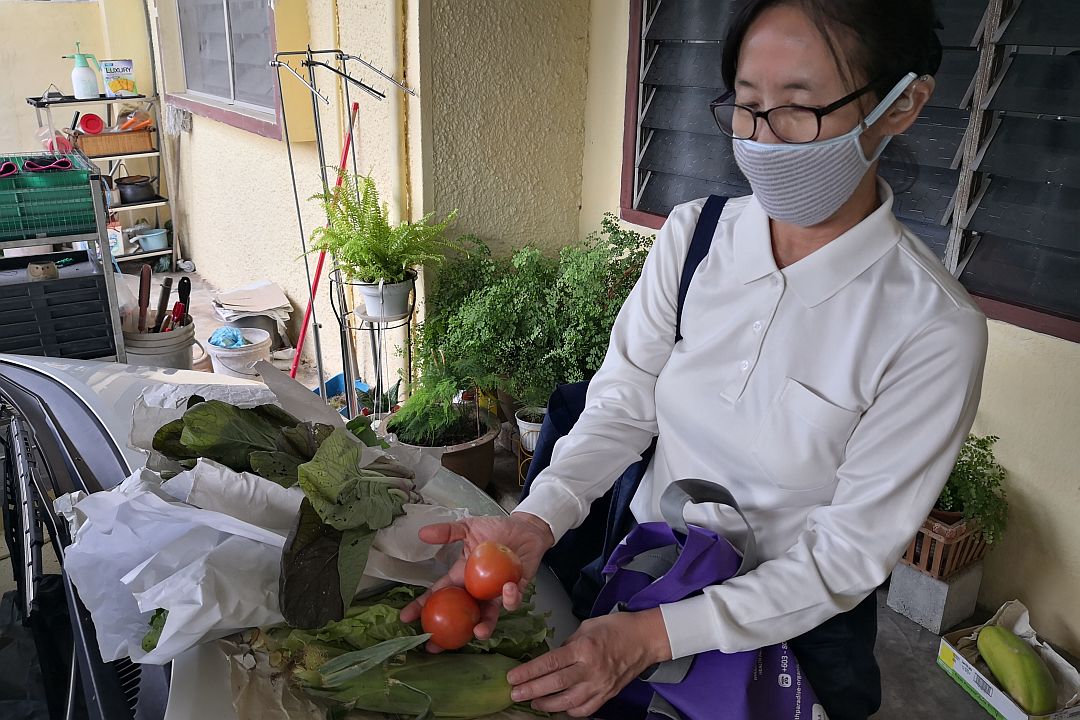
Pleasantly surprised, she shared, “I had no idea the soil could absorb so much. Besides the plants we grow, various other wild plants also coexist. It hit me that everything exists for a reason. There is no need to intentionally grow them as the earth is the best natural nurturing bed.”
Despite fearing farming and having zilch planting experience, Kin Fook dug eight compost pits and reaped the benefits of compacted soil. He said, “I once read that when Master Cheng Yen farmed, she sowed the seeds and compacted the soil because a seedling that struggles grows stronger. I do the same and it works very well.”
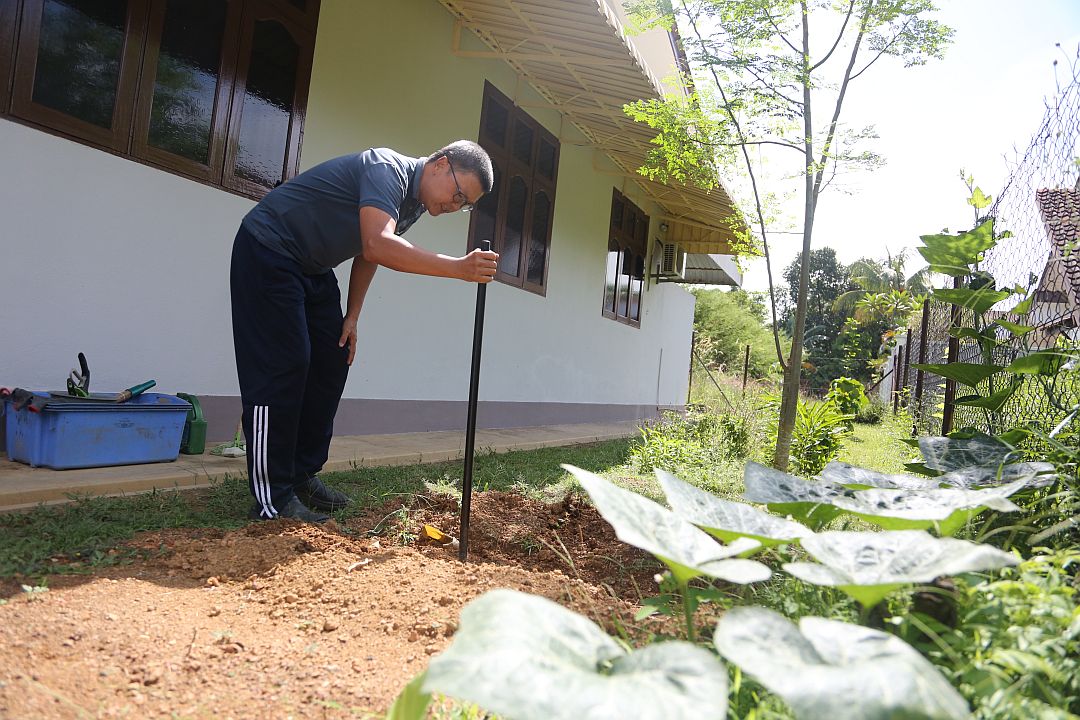
He observed that although some seedlings struggled to grow with only one leaf left on its bare stem, they were determined to live on and new shoots sprouted eventually. This reminded him that there are no obstacles too difficult to overcome in life.
Water spinach, okras, moringa, corn, torch ginger, lotus bamboo and other unknown plants thrived. Occasionally, squirrels, civet cats or smaller insects were spotted as well. Sock Cheng noticed that her son would walk around the yard before and after school to observe the growth of the plants and the behaviour of the crawling ants and lizards. She said happily, “It is the land that allows us to witness symbiosis between living things and it brings us closer together.”
Drifting abroad
Sock Cheng and Kin Fook were born in Malacca. Kin Fook lived and worked in Hong Kong upon graduating from university. A year after their marriage, at age 36, Sock Cheng quit her job and relocated to Hong Kong to live with her husband. To blend into his social life, she would accompany him to play football, drink or sing karaoke. She was once dubbed “Queen of Alcohol” among his friends, but it was not a lifestyle she liked. Moreover, Hong Kong’s fast pace, tense and stressful lifestyle rendered her unable to adapt.
She said, “There is an article titled The Orchid Without Roots that talks about the author who leaves home to live abroad, wandering like a rootless orchid. It reflects my life in Hong Kong. Feeling like an orchid without roots, my heart drifts and I cannot settle down.”
In 2006, her second year in Hong Kong, the couple came across Tzu Chi Hong Kong. Turned out, Sock Cheng once applied for a job at Tzu Chi Malacca. Although unsuccessful, the seed of affinity was planted. Years on, the couple was once again connected with Tzu Chi. From being volunteers, they later became Tzu Chi staff.
An avid reader, Sock Cheng knew that earth’s resources were depleting and the environment was deteriorating. Through Tzu Chi, she also better understood the coexistence between human and nature, that every thought would affect the ecosystem and that change required taking actions. However, back then, she was not inspired to act for the environment. It only affirmed her decision not to raise any child to avoid them from suffering.
For love
In 2008, God sent the most precious gift and offered a turning point in the couple’s lives. When she learnt about her pregnancy, Sock Cheng decided to become a vegetarian, hoping to improve her child’s future living environment. She also started to focus on issues between mankind and the environment.
Concerned that her child would not get adequate nutrition on a vegetarian diet, she researched, consulted doctors, sought support from green organizations and enrolled in nutritional courses. To reduce environmental pollution, she opted for cloth diapers over disposable ones and substituted mosquito repellent spray with garlic. Regardless of the time and efforts taken, she had a clear conscience about treating the environment well. In the face of questioning and doubtful eyes, she persevered.
When pesticides are abused for mass production of food, although costs are reduced and market demand is met, the natural ecosystem is destroyed.
She therefore made an effort to choose organic food that was local, seasonal, free of pesticides and rich in nutrients. She shared, “Organic vegetables can be eaten after they are washed without having to worry about pesticides. Although it is more expensive, if we eat less, we can afford it. It’s our respect and responsibility towards the environment.” Besides, her child is used to having raw vegetables like cucumbers and carrots from the refrigerator as snacks and hence, developed healthy eating habits.
On a Tzu Chi publication, she read that plastic was non-degradable and generated a lot of trash. Since then, she began rejecting plastic packaging and insisted on using her own containers for all food purchases. She also curbed her material desire by identifying the “wants” and “needs” to reduce waste.
Kin Fook, who was initially puzzled about Sock Cheng’s actions, gradually understood her persistence after participating in training and becoming a Tzu Cheng Faith Corps member. Aligning his actions with the principle of protecting the environment, he started scrutinizing his purchases and modifying items, giving them a new life.
“It is easy to spend on things but it adds burden to our home. We can choose used items, buy less or best of all, refuse buying,” he said.
When they were in Hong Kong, although the couple created opportunities for their child to connect with mother nature, it was far less significant than the influence a big city had on a child’s mentality. Concerned with his abrasive attitude and how easily he was tempted by material desires, the couple realized that, perhaps, the metropolitan city was not a suitable environment for a child’s growth.
Home again
In 2018, Sock Cheng returned to Malacca with 9-year-old Zi Jing to visit her family. Seeing her aging mother, who suffered a small stroke, and the simple living environment, she felt an urgent need to carry out her filial duty. Completing her kid’s school-leaving procedure in Hong Kong and returning to Malacca three months later finally set her mind at ease.
Moving from a bustling city into a suburban town, the kid struggled to adapt and was withdrawn. Liaising with Tzu Chi Malacca Great Love Mothers and community volunteers, Sock Cheng learnt ways to accompany Zi Jing patiently through school activities. Under the care of family members, relatives and influence from the community, he gradually stabilized and his attitude softened.
Since Kin Fook returned to Malacca in February 2020, there have been more laughter and compost pits, and less garbage. With an environmentally-friendly lifestyle, they family also managed to keep utility expenses at the minimal. Knowing that Sock Cheng liked cycling to the wet market for vegetables and food ingredients, Kin Fook installed a basket at the back of the bicycle. He also turned an oil container into a handy drain cleaning tool by connecting a water pipe to it. Later, they also started participating in recycling activities at the Ayer Keroh Recycling Education Centre.
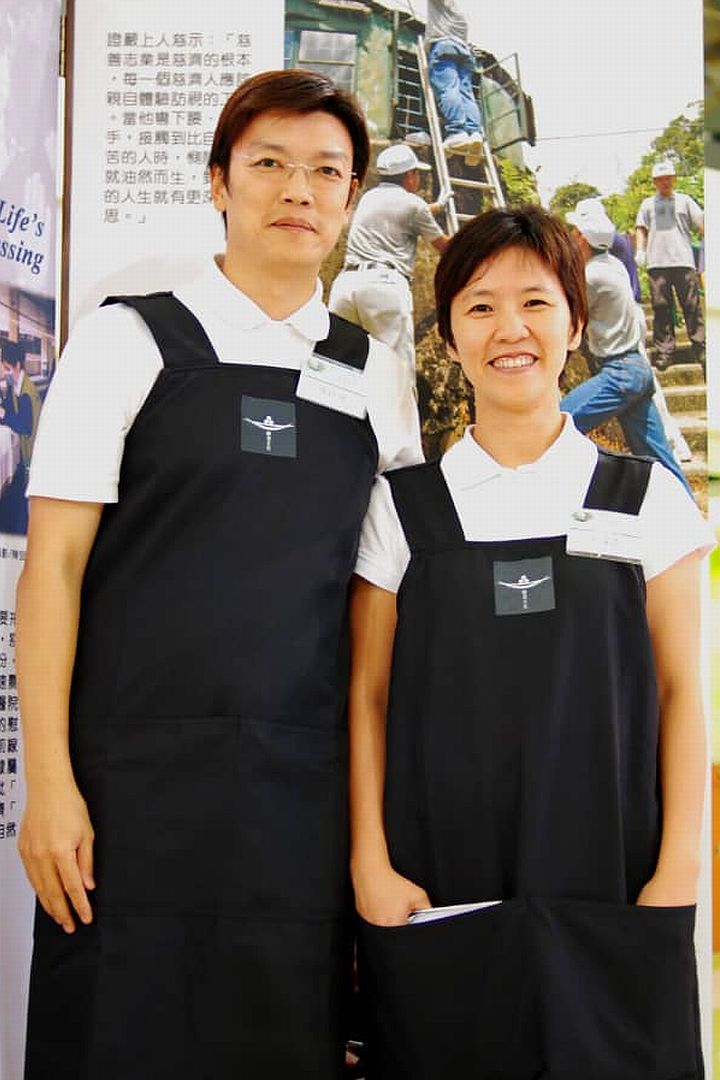
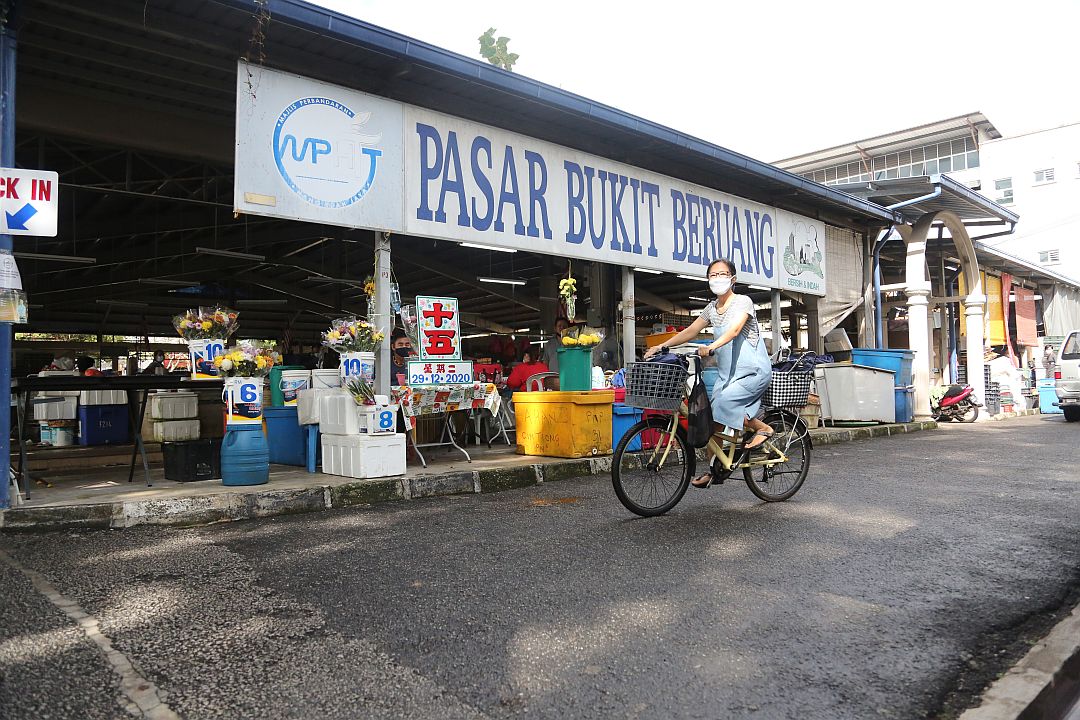
With his parents as role models, environmental protection is “reuse and consume less resources” to Zi Jing. He does not mind wearing used clothes or playing with used toys. He loves reading at the pre-loved books section at the Ayer Keroh Recycling Education Centre, where he found his own world and spends time with his peers.
Once, when he wanted a bicycle helmet, his father brought him one from the recycling centre. He upgraded it by spraying paint and pasting stickers of his own liking.
Environmental protection adds to the topic of communication among the family who realizes the urgency to save and help the sick Earth recover before it is too late. Volunteering as the person-in-charge of the recycling station near his home, Kin Fook brings his family of three to join in recycling with the big community every Wednesday night. Under the encouragement of volunteers, Sock Cheng began sharing her knowledge on protecting the environment with the public and educating the younger generation on recycling.
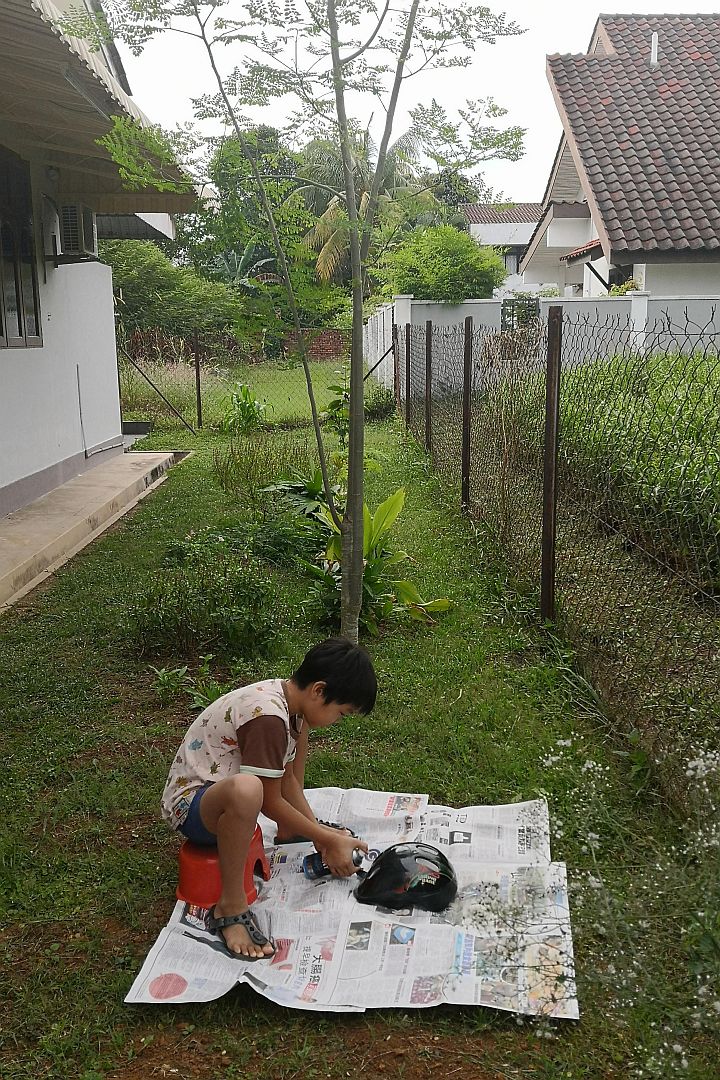
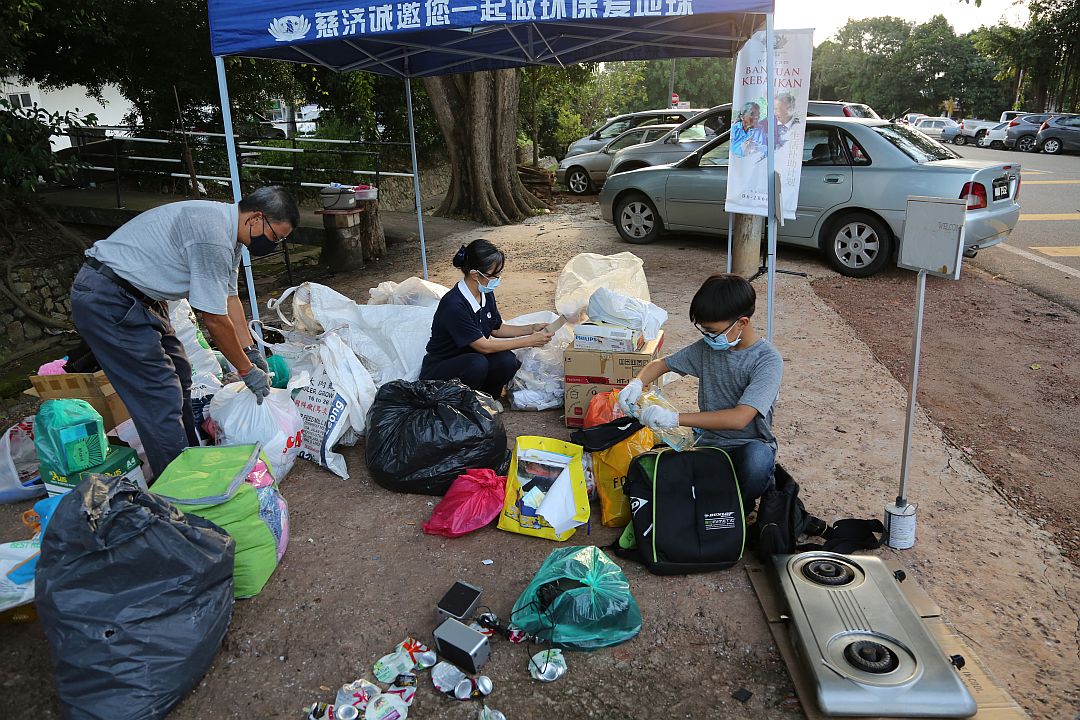
Years ago, despite relocating to live with her husband, Sock Cheng felt out of place in a foreign land; at Tzu Chi, she regained the sense of belonging, of home. Returning to their homeland set the family at ease, drawing them closer to the native land.
“As I plant, I witness many lives and realize how mankind has taken away their living space. I am grateful for their generosity and hope to coexist with them on this piece of land. It is the principle of coexistence among all living beings,” Sock Cheng shared her deepest realization.


![The land brought the Low family closer to each other. [Photo by Low Siew Lian] The land brought the Low family closer to each other. [Photo by Low Siew Lian]](/images/Articles/HB/2021/20201229_LSL01_1_240.jpg)



